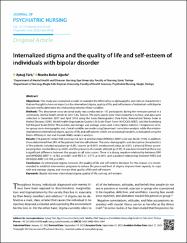Internalized stigma and the quality of life and self-esteem of individuals with bipolar disorder
Citation
Türk, A., and N. B. Uğurlu. "Internalized Stigma and the Quality of Life and Self-Esteem of Individuals with Bipolar Disorder." Journal of Psychiatric Nursing, vol. 14, no. 1, 2023, pp. 49-58.Abstract
Objectives: This study was conducted in order to examine the effect of socio-demographic and clinical characteristics that are thought to have an impact on the internalized stigma, quality of life, and self-esteem of individuals with bipolar disorder and to determine the relationship between these variables. Methods: This descriptive cross-sectional study was conducted on 105 participants during the remission period in a community mental health center in İzmir City, Türkiye. The participants were interviewed face-to-face, and data were collected in December 2017 and April 2018 using the Socio-Demographic Data Form, Internalized Stamp Scale in Mental Diseases (ISMI), World Health Organization Quality Life Scale-Short Form (WHOQOL-BREF), and the Rosenberg Self-Respect Scale (RSES). The number, percentage, and average were used in descriptive statistics. Comparisons of inter-group socio-demographic and clinical variables are made using Spearman’s correlation analysis, while the relationship between internalized stigma, quality of life, and self-esteem, which are conceptual variables, is evaluated using the Mann–Whitney U test and Kruskal–Wallis variance analysis. Results: The patients' mean ISMI score was 58.56±18, and the mean WHOQOL-BREF score was 96.48±19.98. In addition, it was determined that 26% of the patients had low self-esteem. The socio-demographic and descriptive characteristics of the patients included education (p<0.05), income (p<0.001), employment status (p<0.01), a physical illness accompanying their mental illness (p<0.05), and the presence of a suicide attempt (p<0.05). It was determined that there was a significant difference between the groups on all scale scores. There is a strong negative relationship between ISMI and WHOQOL-BREF (r:−0.782, p<0.001) and RSES (r:−0.773, p<0.001), and a positive relationship between RSES and WHOQOL-BREF (r:0.749, p[removed]


















